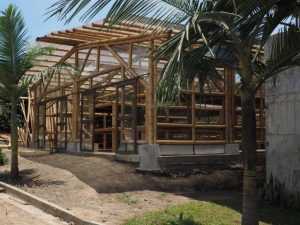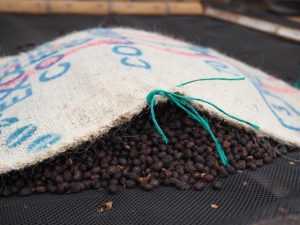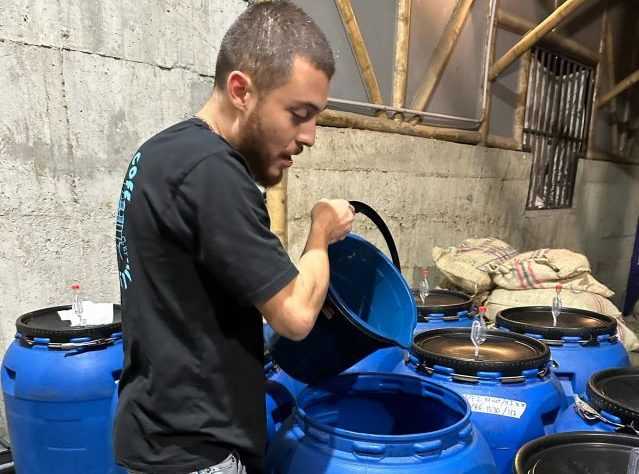MILAN – Juan Felipe Restrepo is the farmer of Finca Chambakú in Colombia, a Medium – Small farm that truly believes that the fermentation process is a solution for reaching new challenges and markets, It has an extension of 15 hectares dedicated just to coffee plantation and processing; Chambakú is located in the mountains of Villamaria in Caldas region between altitudes from 1460 to 1800 m.a.s.l.
Actually, they are in a transformation process where permaculture, environmental facts and Coffee Varietals are the priority, offering new options of diversity of profiles they have been planting Pink Bourbon, Catiope, Yellow Caturra, Red Caturra, Cenicafe 1 and Castillo.
Restrepo, how long have you been a farmer? Is it a family business or did you start it independently?
“I’ve been 12 years ago in the coffee industry, 8 years ago as a Coffee Processor and 5 years ago as a farmer in a third generation coffee family. It’s a beautiful story because it is a family business but the vision of the management and the profiles where so divided; so, I started to process cherrys from other coffee growers as a personal project, having a good response for the U.K. market.

At that moment, we decided as a family to develop the project together and give a new direction to the work we were doing… and here we are all back together taking this ship to new seas.”
How has the Colombian coffee market been transforming in recent years? Is the specialty becoming more widespread?
“Colombian coffee growing has had a very sudden and accelerated evolution and transformation, in less than 10 years we have reconceptualized the traditional idea that we have had of this business for more than 100 years and this is something that we should highlight.
On the other hand, quality is not being generalized but it is being focused in regions with less coffee tradition, which allows us not to have a bias that complicates the process of innovation and development.
The more traditional regions have a bigger challenge environmentally and in terms of processing, because their format and size make it difficult to control the variables involved in the coffee fermentation process.”
How many farmers actually know they are growing specialty?
“It’s hard to give numbers to this answer because sincerely I do not have them, but regions like Cauca, Nariño and some other hidden gems in non traditional coffee regions for sure could be 30% – 40% of those producers in my opinion.”
What does it represent for farmers to be able to put specialty on the market, in terms of remuneration?
“In my opinion it represents dignity and value for the difficult work, the risk that is run from cultivation, processing and drying… coffee growing in the traditional Colombian format is made so that the coffee grower is always poor and dependent on institutions; so I think it represents independence and dignity for them and their families.”
Is it difficult to export? Are there a lot of intermediaries standing between the producer and the roaster?
“Yes, it is very challenging and demanding…the knowledge behind the logistics, economics, storage and distribution can be a really big trouble.
Knowadays there are less intermediaries between them, but at least there are 3 intermediaries minimum.”
How is the phenomenon of origin fermentation going? Do the producers actually know how to manage the process correctly, or are they following a trend whose mechanisms they do not know well from a chemical-scientific point of view, however?

“It’s a trend and each day we can find more coffee growers working on experimentation and trying to develop new products but the knowledge and access to information make this effort of creation an uncontrolled process that could represent some risks for the consumers. There are just a few coffee growers who are performing scientific methods and applications of microbiology and trace analysis to the fermentation of our coffees.”
What do you think of the organic certifications that are often required of farmers today? Are they useful for you originally, or are they an externally imposed limitation?
“It do not represent any value for the coffee growers, it’s an imposed limitation that is not updated with the needs of coffee growers and their environment, besides not understanding the evolution or the context of the producing countries;
I will give you an example, in Colombia we have an exposed coffee agriculture (not use of shadow) with more than 150 years of tradition, where we have never had the delicacy to let the land rest between each productive cycle or planting … that is to say that we have never allowed the land to return what we have extracted from it.
Do you think that without the use of chemical supplements we could obtain exceptional results? No.”
What we could rescue and that would be of help to coffee growers are the demands in the non-use of herbicides to the soil… let’s remember that the microbiota necessary for excellent cup results is all in the soil.”
What are you doing to address the problem of climate change? Are you investing in research and new technologies to preserve production and find new agricultural solutions?
“At Finca Chambakú we are in the process of designing and implementing our environmental offer.
At this moment we are doing a study on native flora which we are investigating in 2 water springs that are present in our highest and newest lot called El Renacer.
From there we are taking the endemic species and we are taking them to different areas of the farm to analyze their behavior, viability of development and reproduction. In this way we seek to contribute to the reduction of our carbon footprint and to function as a small purifier and producer of oxygen for our area.
On the other hand, the management of the residual waters resulting from the coffee washing process, which are clarified and improved through microorganisms before being reincorporated to the affluents.”
What would you say to an Italian consumer who finds it outrageous to pay more than one euro for an espresso?
“I don’t blame him, there is still a lot of misinformation about coffee and its processes but I would like to associate it to wine since this is a product that has the same stages and processes as coffee, with an aggravating factor and that is that in coffee you only have a few hours to process it and get the best out of it…while in wine you can have more time to work on its attributes.
What I would like to get at with this is the risk that we producers run of deteriorating the quality of a product that we have been working on for more than 9 months, that is only if we talk about plants… but if we talk about soils, we can have up to 8 years of work to find a result.
So, keep in mind that it is a product of hard work, effort, dedication and luck.”
In the future of Colombian specialty, but Colombian coffee in general, what can you glimpse?
“Surely the creativity and resourcefulness of the Colombian coffee grower; and I believe that if we manage to unify the new generations with the investigative, monetary and infrastructure resources of the Colombian Coffee Growers Federation we can continue with the development of new varieties that can contribute to the fulfillment of the quality expectations of the consumers and in the same way contribute to a more dignified, inclusive and avant-garde coffee growing.”










